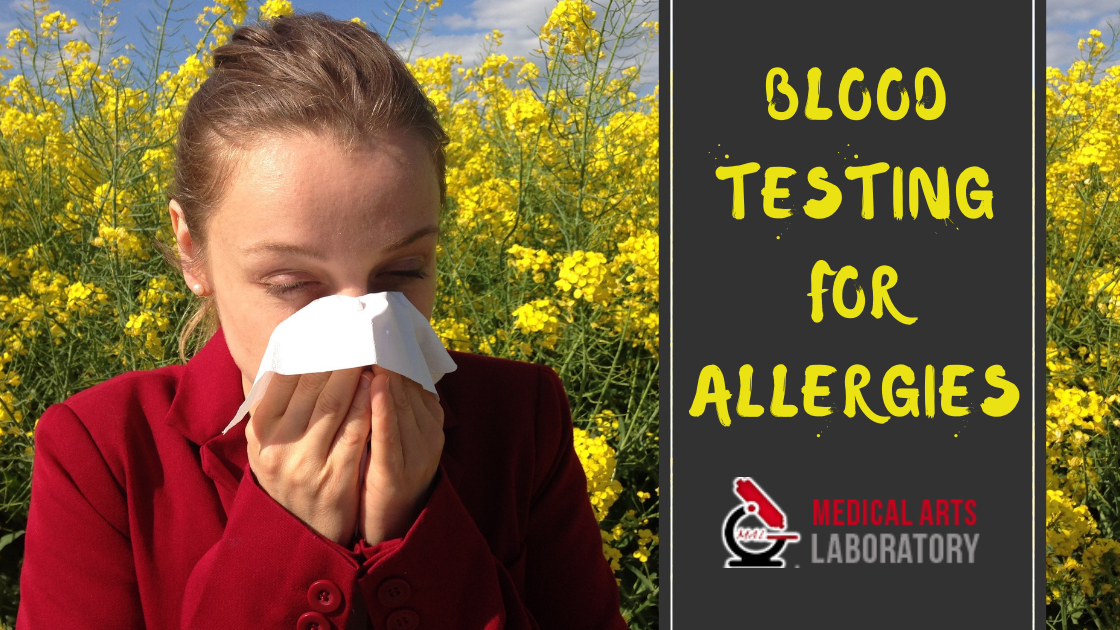
18 Apr Blood Testing for Allergies
If you live in Florida, you know the vast amounts of pollen in the air can send your allergies into a frenzy. But if you haven’t been officially diagnosed with an allergy, this is the time to see your doctor so that her/she can prescribe an allergy test. While most people think of allergy testing as the traditional skin test, blood testing for allergies is becoming increasingly popular. It can be taken at any time, even if you are on medication, and requires the use of only one needle.
Blood testing for allergies can be more expensive and the wait for results somewhat longer, yet there are circumstances which may lead your doctor to recommend it over the skin test.
• You are using a medicine known to interfere with test results and cannot stop taking it for a few days
• Cannot tolerate the many needle scratches required for skin testing
• Have an unstable heart condition
• Have poorly controlled asthma
• Have severe eczema, dermatitis, psoriasis, or another severe skin condition
• Might have an extreme reaction during skin testing or have a history of life-threatening allergic reaction called anaphylaxis
Blood tests measure the presence of IgE antibodies to specific foods. (IgE, short for “immunoglobulin E,” is the antibody that triggers food allergy symptoms.) In the past, these tests were called “RASTs” (which stands for radioallergosorbent tests) because they used radioactivity, but modern tests do not.
Allergy blood tests usually screen for at least 10 of the most common allergy triggers, including dust, pet dander, trees, grasses, weeds and molds related to where you live. They are also particularly helpful in diagnosing food allergies.
Who should be tested for allergies?
Your doctor will order an allergy test if you or your child has symptoms of an environmental or food allergy. Trying to diagnose yourself with an over-the-counter kit can do more harm than good, as test results can only be knowledgeably interpreted by a physician.
According to the American College of Allergy, Asthma & Immunology, Allergies in infants and children are common; in fact, allergy-related disorders are among the leading diagnoses of chronic diseases in children. According to one study, 4 to 6 percent of children have food allergies, 8 to 10 percent have asthma and 15 to 25 percent have allergic rhinitis (hay fever). Collectively, children with allergies miss hundreds of thousands of school days every year.
Common allergies screened by blood testing
Blood testing for allergies can screen for numerous substances that you may be allergic to.
The most common include:
Food – Most cases of food allergy in the United States come from milk, eggs, soy, wheat, peanuts, tree nuts, fish and shellfish. Sensitivity to milk, eggs and peanuts are common in children, whereas sensitivity to peanuts, tree nuts, fish and shellfish are more common in adults. In some cases, food allergies for children can be outgrown over time, such as milk, soy, wheat and eggs.
Inhalants – Dust mites, animal dander, cockroach debris, molds, trees, grasses, weeds and ragweed can cause a reaction. Dust mites, animal dander and mold spores will cause a reaction year-round; pollen will affect you seasonally.
Drugs – The list of drugs that you can be allergic to is vast: penicillin, neuromuscular blocking agents, chlorhexidine, insulin and gelatin. Most of these drugs can be found in medicine, so determining an allergy to any of them is vitally important, as it will affect the medications your doctor will prescribe for you.
Latex – Allergy to latex is common in healthcare workers and patients with spina bifida. People in these situations encounter latex more than the average person, leading to the reaction.
Insect Venom – People allergic to insect venom can experience a delayed reaction after being stung. Those with this sensitivity may qualify for venom immunotherapy to prevent a fatal reaction.
For allergy blood testing near you, Medical Arts Laboratory offers a wide variety of blood tests. We invite you to read our blog about what a high white blood cell count means on a blood test, and the blood tests that women should take.
Contact us today.




No Comments